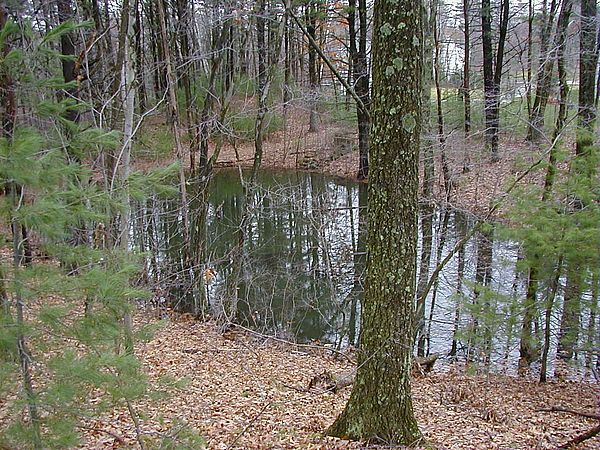They may look like wicked-big puddles, but the seasonal pools of water that fill with snowmelt, rain, and spring’s rising groundwater play an almost magical role in the cycles of life.
Vernal pools, when filled with water, teem with life and serve as a critical breeding ground for species of frogs, toads, salamanders and fairy shrimp. They begin to fill with water in late winter, dry slowly during the spring and then are completely dry in the summer.
Because a vernal pool dries, fish cannot live there, and many species have evolved to use this temporary wetland for safety from predators.
This evolution sparks a mysterious signal on rainy early-spring nights. Something triggers the migration of spotted salamanders and wood frogs from their woodland habits to a vernal pool for breeding. Some can travel up to half-a-mile.
If you’ve been out for a walk near woods and wetlands in the past few weeks, you may have heard a noise that sounds a bit like a duck. Likely it is the call of the male wood frog, trying to attract a female to breed in the vernal pool.
If you come upon a vernal pool, this is the best time of year to observe tiny tadpoles swimming about, masses of frog or salamander eggs, or delicate fairy shrimp.
The aptly named Fairy Shrimp are crustaceans who seem to have magic survival powers, according to MassAudubon.
“They hatch and develop early in the season, before most predators arrive. Their hardy eggs stay in the pond's dry sediment, resistant to drought and cold, and can even survive being ingested and then eliminated by animals,” according to MassAudubon’s website.
In Massachusetts, officially designated vernal pools are protected under the Wetlands Protection Act regulations. Not all temporary pools of water qualify. So-called “obligate” species must use them for part of their life cycle.
These obligate species include wood frogs, spotted and blue-spotted salamanders, and fairy shrimp. They provide an important food source for small carnivores.
Greenbelt properties with vernal pools include Carter Reservation and Tompson Street in Gloucester, Warren Weld in Essex, Julia Bird in Ipswich, Bald Hill in Boxford, Barrett Reservation in Middleton, Farnsworth Reservation in North Andover, and Woodland Acres in Rockport
Head out to see this critical part of the “circle of life.” You may come away with a better understanding of why these nurseries of life must be protected.

